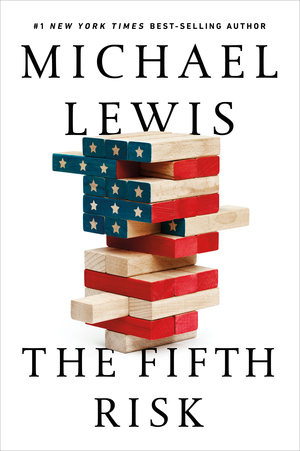3 Feb. 2019. The U.S. government funding impasse and shutdown that ended last week — temporarily perhaps — showed many Americans the vital services provided by their federal government, as those services disappeared for more than a month. And while the news media reported largely on functions felt directly by citizens, such as national parks and air travel, some commentators pointed out increasing risks to safety and security of society at large, the longer the shutdown dragged on.
Michael Lewis describes in a gripping narrative some of those critical life-protecting functions the federal government performs in his new book The Fifth Risk. The story first tells about the transition from the Obama to Trump administration, where in one case after another, background materials and briefings carefully prepared by career officials were ignored and minimized, first by Trump transition teams and then by appointees. But Lewis uses these experiences to show misconceptions and biases of incoming Trump appointees reflecting ignorance by the public at large of vital functions performed by federal departments.
An example is Department of Energy, and Trump-appointed secretary Rick Perry, the former Texas governor. Perry’s ignorance of the department first became evident in 2011, when in a Republican presidential candidates debate, he called for its demise, sort of. There, he called for abolishing 3 federal departments, but after listing Commerce and Education, he could not remember the third department, which was Energy, and uttered his famous “Oops” remark. In 2017, Perry took the secretary post thinking he would work on production of oil and fossil fuels, only to discover most of DoE’s work monitors and regulates nuclear energy, both domestic and foreign.
Lewis describes these functions by telling the stories of senior career officials who see their functions as managing risks, often high and unpredictable risks. Managing risk rarely makes for a page-turning tale, but Lewis creates a riveting narrative with the personal stories of senior career officials in departments of Energy, Agriculture, and Commerce. Nearly all of the individuals portrayed deal with federal government functions often unknown, taken for granted, or misunderstood.
Science and data play a big role in Lewis’s narrative, with science and data often losing out to ideology as Trump appointees took over. One example is Advanced Research Projects Agency – Energy with the acronym ARPA-E that funds research on bold novel ideas for producing, storing, and saving energy. Even with taking a tiny percentage of the total DoE budget, ARPA-E has been in the cross-hairs of ideologues and fossil fuel enthusiasts since it began in the Obama administration. The first Trump budget totally eliminated ARPA-E, with funding later restored by Congress.
But Lewis shows in some detail how federal agencies use data to manage risk. Inside Department of Commerce is National Oceanographic and Atmospheric Administration, or NOAA, that includes National Weather Service the agency that predicts weather. Predicting weather seems like a routine function, but if that weather includes a tornado, then adding even a few minutes to the prediction can let communities in its path more time to take cover.
Lewis quotes a former Bush appointee briefing Trump’s Secretary of Commerce appointee Wilbur Ross on the value of NOAA and science in general. The appointee asked Ross about his philosophy for Department of Commerce, and explained …
“It’s not really the Department of Commerce,” said the Bush official. “Its mission is a science and technology mission.”
“Yeah, I don’t think I want to be focusing on that,” said Ross.
The Fifth Risk
Michael Lewis
W.W. Norton & Co.
Hardcover
October 2018
ISBN 978-1-324-00264-2
6.5 × 9.6 in / 256 pages
* * *


 RSS - Posts
RSS - Posts
You must be logged in to post a comment.